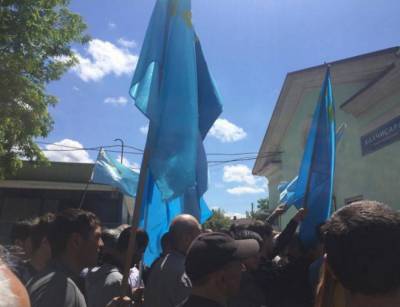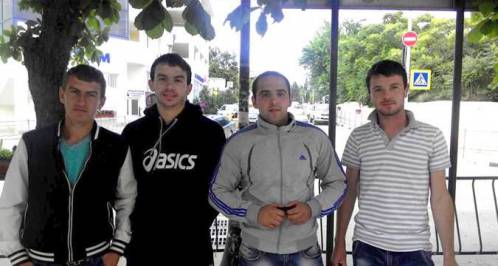Crimean Court refuses to find Crimean Tatar remembrance unlawful
 The attempt to stop people gathering in Bakhchysarai on May 18 failed, however the FSB were reported to be openly videoing those present
The attempt to stop people gathering in Bakhchysarai on May 18 failed, however the FSB were reported to be openly videoing those present
The first good news from any court since Russia invaded and annexed Crimea caught everybody unawares. On June 7, the Sudak City Court found nothing illegal about the actions of four Crimean Tatars detained on May 18 over a peaceful act of remembrance for the victims of the 1944 Deportation, and terminated all proceedings.
The four young men had been accused of infringing the established procedure for organizing or holding meetings, demonstration, etc. This falls under Article 20.2 of the Code of Administrative Offences and carries a fine of up to 20 thousand roubles or compulsory work for up to 40 hours.

The four young men were detained while trying to drive from Simferopol to Bakhchysarai, a symbolic act of remembrance which was traditional until Russia’s annexation of Crimea.
Similar detentions in 2015 resulted in courts imposing administrative penalties, so the Sudak court’s recognition that the men had committed no offence was welcome and unexpected.
Stalin’s Deportation of the entire Crimean Tatar people has been recognized by Ukraine as an act of genocide. This year was the third anniversary under Russian occupation, with the occupation regime each time effectively banning all remembrance activities except the official flower-laying by the Russian-installed leaders in Crimea.
This year regional mejlis, or Crimean Tatar self-governing bodies were refused permission to hold the traditional gatherings. As reported earlier this was fully expected, and not only because Russia had dropped any pretence and banned the Crimean Tatar Mejlis.
The 70th anniversary of the Deportation came just two months after Russia annexed Crimea. On the eve of the anniversary, all public events were banned. Although the occupation regime was eventually forced to accept that people would gather together in prayer and remembrance, all kinds of restrictions were imposed. There were even military helicopters flying over prayer gatherings outside Simferopol and Bakhchysarai, to drown out the prayers and as a form of intimidation.
This year they used threats, detentions and even warned schools that the number of students absent would be noted and their parents asked to explain the children’s absence.
None of this, nor the FSB at gatherings openly videoing those present, stopped all the remembrance events, though most people heeded the Mejlis’ call and joined in actions around the Ukraine-wide Minute of Silence that would not provoke the so-called authorities.
Among those present at the unobstructed remembrance gathering in Kyiv was Yaakov Dov Bleich, Chief Rabbi of Ukraine. He warned that what the Jews experienced “during the Holocaust when all nations were silent is being repeated now” with the repression of Crimean Tatars under Russian occupation.
“Today the main thing for me as a Jew living here in Ukraine and that I say everywhere is: “Where are you? Where are all the nations? Where is the United Nations? Where are other countries? They are all busy with their own problems.
The cry must come from here so that it is heard throughout the entire world, that we will not be silent, that we will not allow those things that had seemed in the past to be repeated”.





